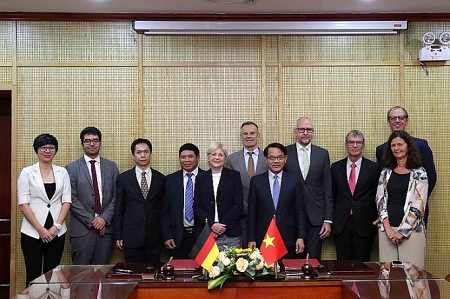VN, Germany lay foundation for green growth orientation
VGP – Germany and Viet Nam agreed to expand their cooperative relations in the future-oriented areas, including vocational training, energy and the environment, during the recent negotiation session on development cooperation between the two governments in Ha Noi.
 |
|
Photo: MPI |
Partnership focuses primarily on the areas, including the effective energy supply, the ability to access the renewable energy markets, the protection of coastal areas through replanting mangrove forests in the Mekong Delta and the implementation of a sustainable forest economy in the northern and central regions.
In addition, the two sides also agreed to support sustainable rice cultivation in the Mekong Delta within the framework of the “Green Innovation Centres” initiative. In this regard, small agribusinesses in the Mekong Delta region will benefit through being connected to the value added chain.
In the field of vocational training, the two countries want to mobilize Vietnamese and German companies to take over vocational training for Vietnamese youth across the country.
The German Federal Ministry of the Environment, Nature Conservation and Nuclear Safety (BMU) also pledged €30 million for the next support package under the framework of the International Climate Initiative to fund the biodiversity and climate protection projects in Viet Nam.
Also, BMU provided an additional €11 million for a project to reduce plastic waste on the Mekong River.
In 2020, Viet Nam and Germany will look back on 45 years of successful diplomatic ties between the two countries. A milestone in bilateral relations is the establishment of Viet Nam-Germany strategic partnership in 2011, in which development cooperation is a basic area of cooperation.
This year’s negotiations took place when the Government of Viet Nam is defining its socio-economic goals for the next decade in a 10-year socio-economic development strategy.
At the same time, the German Government is also comprehensively reforming its development cooperation strategies to better align with the changing realities in partner countries and to make its contributions more effective, thus implementing the International Agenda, especially the 2030 Agenda and climate protection goals set in the Paris Agreement.
By Vien Nhu
